Eccentric British country sports: from cheesing chasing to snail racing
Our guide to 10 of the most bizarre British country sports, annual championships of the strangest kinds that draw people from across the world
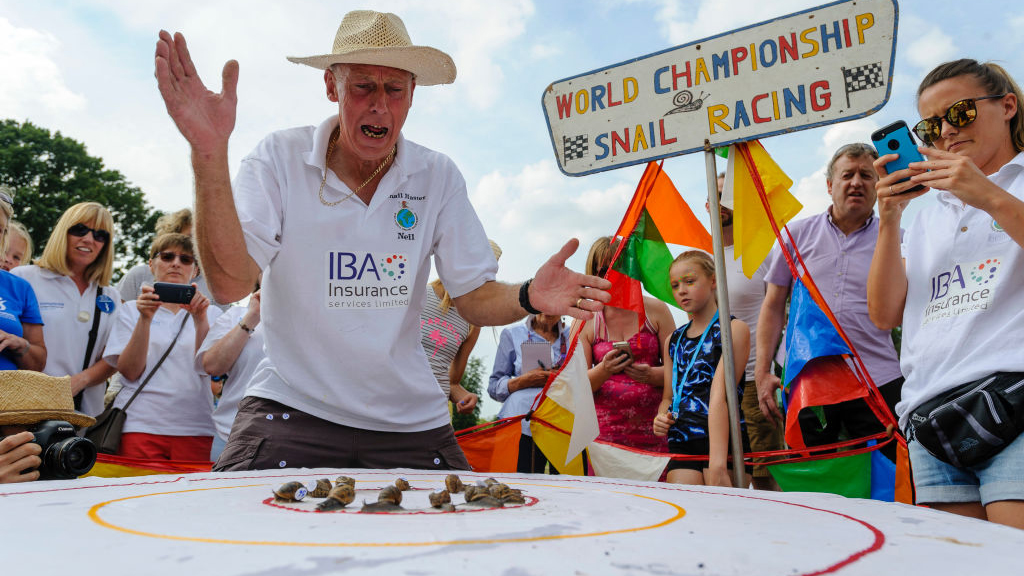
All the latest inspiration, tips and guides to help you plan your next Advnture!
You are now subscribed
Your newsletter sign-up was successful
Britain is a land that, whilst progressive and forward thinking for the most part, holds on to its traditions like limpets clinging to rocks. Just take a walk around London’s Horse Guards Parade or Buckingham Palace and you’ll see what I mean. “Daddy, why are they wearing those silly hats?” Yes, from its world-famous royal family to bizarre British country sports and frankly oddball customs still practiced in some of its rural areas, Britain can be a rather eccentric place.
As a Brit myself, I’ve enjoyed many a bonfire and firework display on Guy Fawkes night, the somewhat less-than-subtle tradition that rightly or wrongly warns people not to rise up against authority. I saw Bonfire Night antics taken to a whole new level the first time I visited my wife’s hometown of Ottery St Mary, where people would run through the crowded streets, hunched under the weight of a barrel of tar that had been set ablaze. I was glad I wasn’t the one doing the risk assessment on that particular night. Britain is a bit odd.
I consider myself to come from quite a normal British family. Though, even then, my father was a Morris dancer in his younger days. He’d tour the country with the Great Western Morris group jangling about wearing bells and clonking wooden sticks with his fellow dancers. He’s mellowed a little with age, he now spends his retirement travelling the country by train, visiting stations, and ticking off all the locomotives he’s seen. Yes, Brits are a little bit strange.
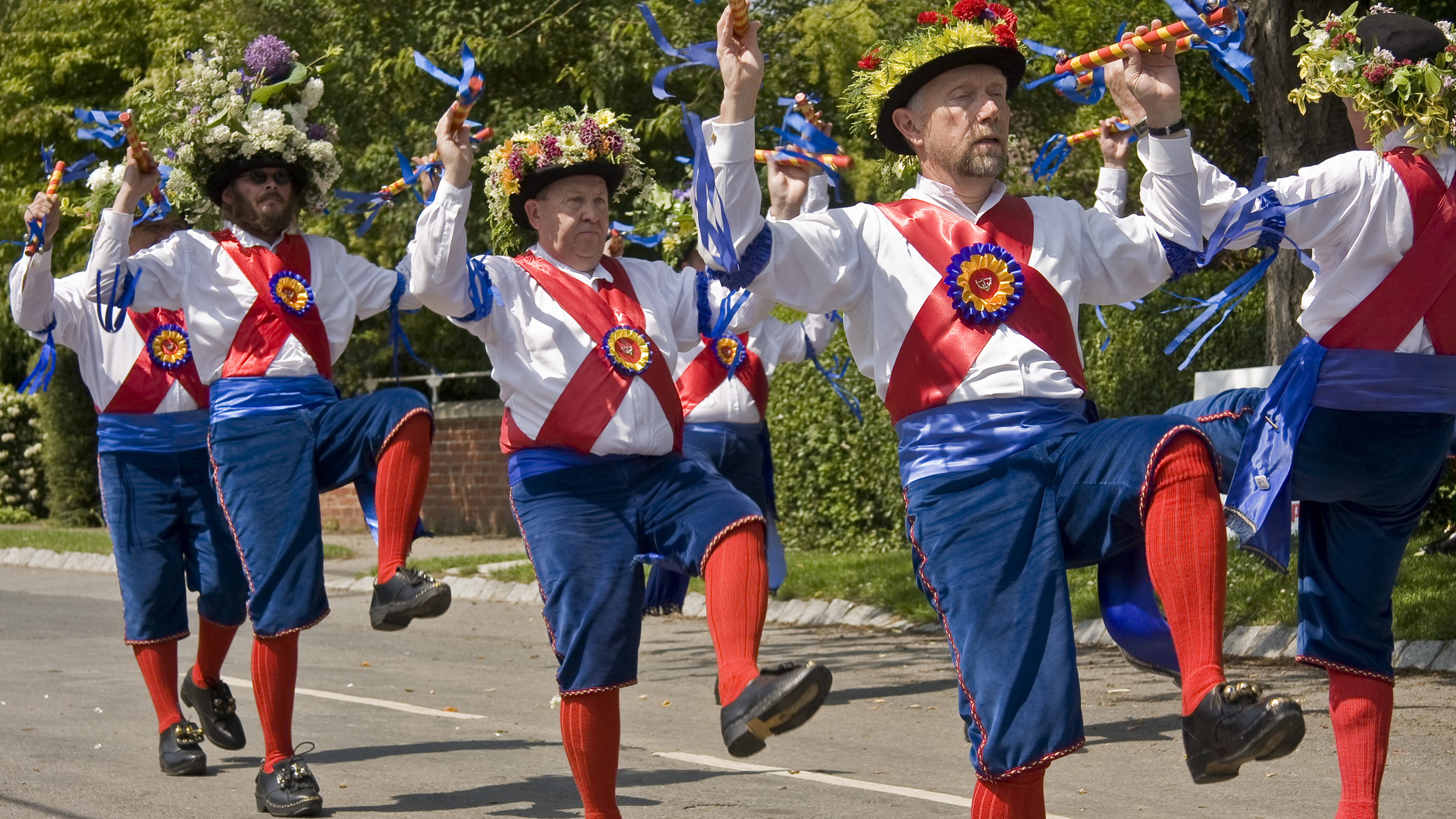
Anyway, in this feature we’re focussing on British country sports, the weird, wonderful and unique games that take place annually in various corners of the countryside. There’s everything from a death-defying downhill dash after a wheel of cheese – which even the best trail running shoes wouldn’t cope with – to the highly competitive sports of worm charming and nettle eating. Suspend your disbelief for a moment… Let’s get into it.
Meet the expert

Originally from Cumbria, home of the Lake District, England’s largest National Park, Alex has lived in various places across the nation and travelled extensively around the whole of the UK. Like all Brits seem to, he revels in tradition and loves nothing more than a cup of tea and a Cheddar cheese toastie in the afternoon.
Tin Bath Racing – Castleton, Isle of Man
- Over 100 participants race tin baths around a 400-meter course in Castleton's harbour
- The race has been running since 1971
The Isle of Man, nestled in the middle of Irish Sea, is a great place to visit with your hiking shoes. It's got a glorious coastal trail, Raad ny Foilan, and scenic fells (a Northern English word for a hill, derived from the Norse Fjäll) to explore. It’s also home to the famous Isle of Man TT, one of world’s most dangerous motorbike races.
However, where eccentricity is concerned, the annual World Tin Bath Championship is hard to beat. Held in the town of Castleton every July, over 100 participants race tin baths around a 400-meter course in the harbour. The tubs themselves are strictly regulated – performance-orientated adaptations are not allowed, thus levelling the playing field. If only the same could be applied to Formula One!
The race has been running since 1971 and was, in very British fashion, inaugurated by the Castletown Real Ale Drinkers Society, possibly after a few drinks…
All the latest inspiration, tips and guides to help you plan your next Advnture!
Cheese rolling – Cooper’s Hilll, Gloucestershire
- Participants race down an incredibly steep 180-meter long hill
- The prize is a wheel of cheese, which the competitors chase down the hill
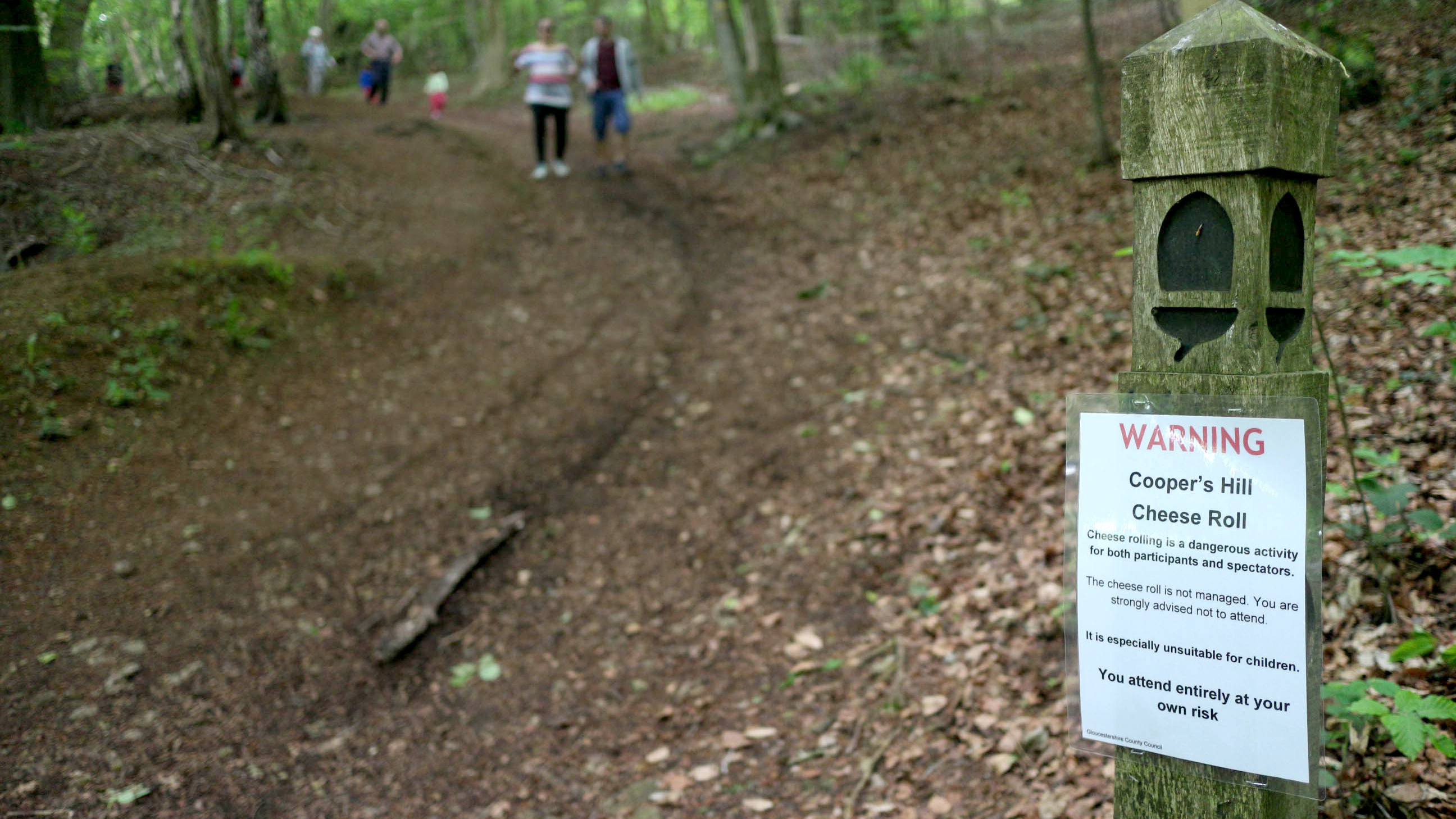
Britain’s fell running traditions are very strong and many of the nation’s mountain running greats have mastered how to run downhill safely. However, the Cooper’s Hill Cheese-Rolling and Wake event in the county of Gloucestershire takes running downhill to a whole new level, throwing in a wheel of Double Gloucestershire cheese for good measure.
Taking place every Spring Bank Holiday, the race sees participants launch themselves down the incredibly steep, 180-meter long hill in pursuit of the cheese. The goal is to catch it, though it’s a tough ask, as the tumbling wheel reaches speeds of 70mph. To call this a 'run' would be inaccurate, it’s more of a mass tumble, as the video below illustrates.
If you want a sense of how important the tradition is, even in 2020 and 2021, when the race was cancelled due to Covid-19 restrictions, the cheese was still rolled from the top of the hill, just to uphold the convention.
Bog Snorkelling World Championships – Llanwrtyd Wells, mid Wales
- Participants swim 60-meters through a boggy trench in Wales' Llanwrtyd Wells
- The event has been running since 1985
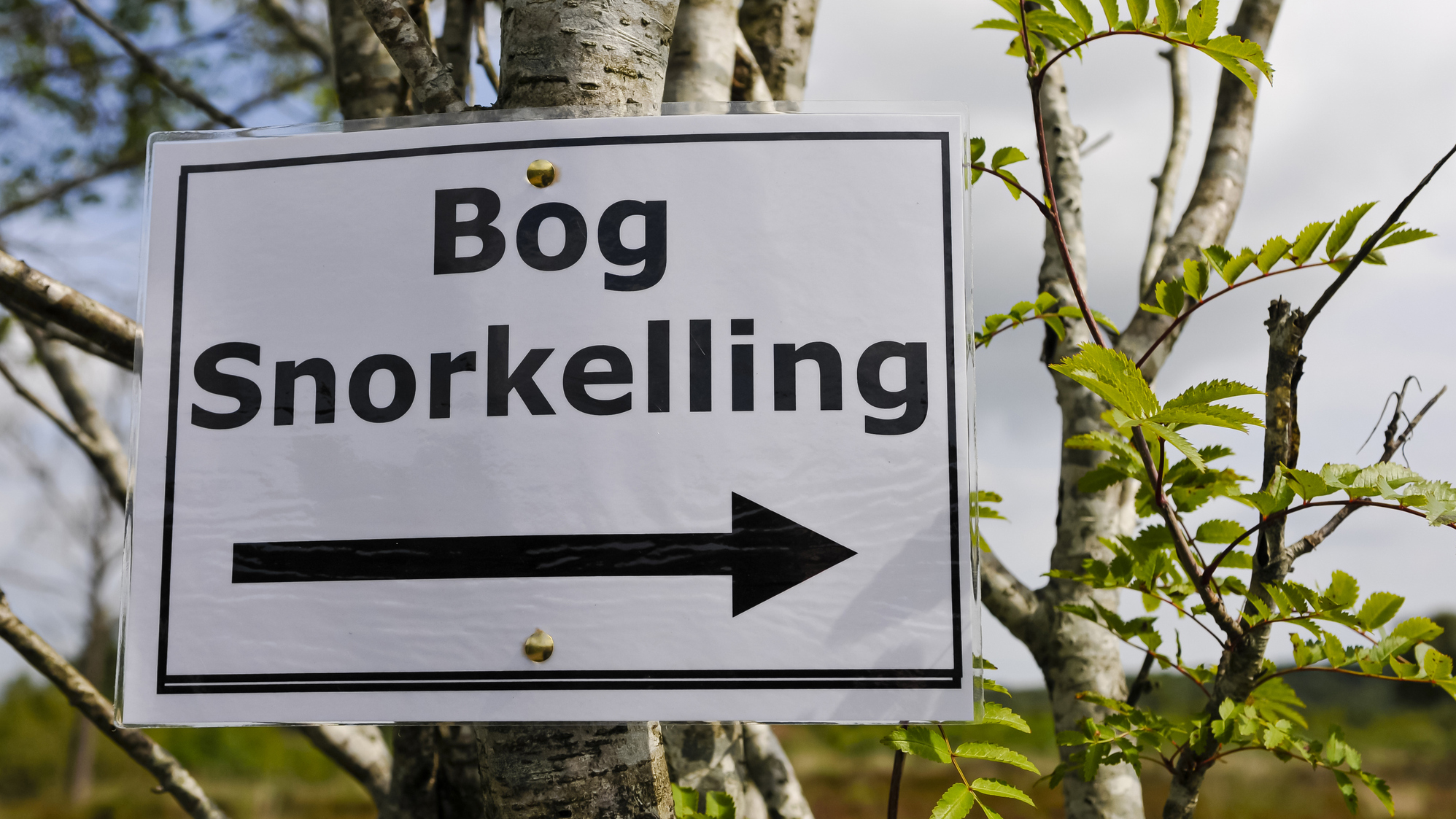
Every August bank holiday, a mass of competitors assemble with their diving masks and snorkels in Llanwrtyd Wells, a small market town in the rural heart of Wales. They come to compete in the Bog Snorkelling World Championships, a quite bizarre event that sees participants swim 60-meters through a boggy trench. The legendary Neil Rutter, four times champion, is the holder of the record time. His 2018 effort coming in at an impressive 1 minute 18 seconds and 23 hundredths.
The event has been running since 1985 and sees people from all over the world compete. The hype was probably helped by Lonely Planet describing it as one of the world’s top 50 ‘must-do’ experiences. As well as the bog snorkelling, there’s also the strenuous Bog Triathlon, which also takes in an 8-mile run and a 12-mile MTB ride. Of course, the idea was first conceived in a pub…
Welly wanging – Upperthong Village
- Welly wanging is a lot like the javelin, only with wellies
- It’s thought to have emerged in England’s West Country in the 1970s
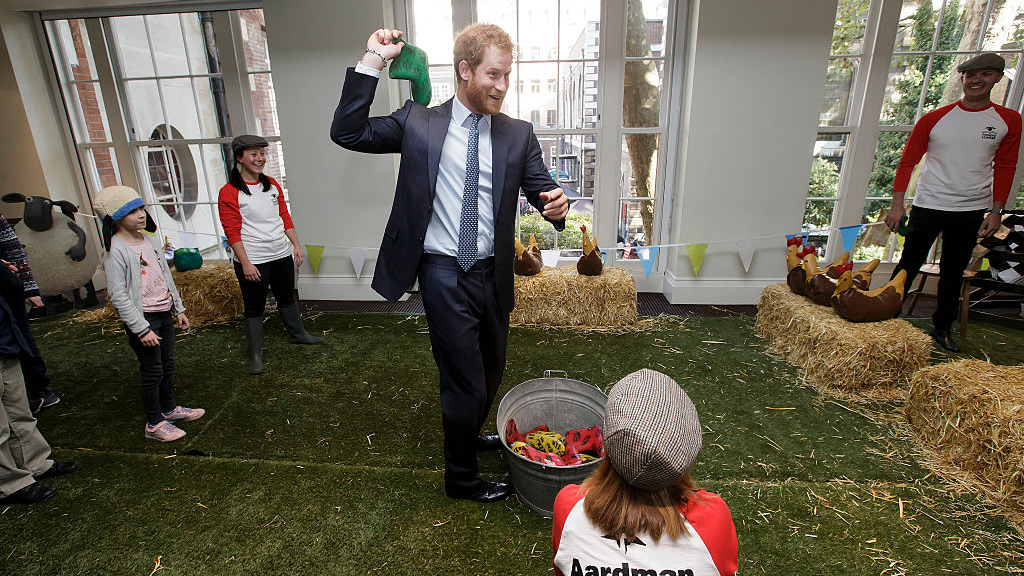
Welly wanging is a pursuit where the participant aims to throw ('wang') a Wellington boot as far as possible. It’s thought to have emerged in England’s West Country in the 1970s but has spread across the country, clearly gaining a place in many people’s hearts.
These days, welly wanging’s spiritual home is arguably the wonderfully named Upperthong village in the English county of West Yorkshire, with its World Welly Wanging Association (WWWA) and the annual Welly Wanging World Championships. Among the stated rules insisted upon by the WWWA is that a maximum run up of 42 paces shall be allowed. This rule was conceived by Douglas Adams, the author of the classic Hitchhikers Guide to the Galaxy novels and himself an avid wanger. The Upperthong village website states that the sport must be ‘played with the upmost of British sportsmanship and a large smattering of sense of humour.’
Other wanging associations are found in Settle and Wellington, both in Northern England, as well as in Taihape, New Zealand and Helskinki, Finland. Talk about global appeal! Even the Royal Family have indulged in a bit of welly wanging in their time.
World Nettle Eating Championships – the Bottle Inn, Marshwood, Dorset
- Competitors are given stalks of stinging nettles
- Whoever eats the most wins
- It was thought to have originated after an argument between local farmers
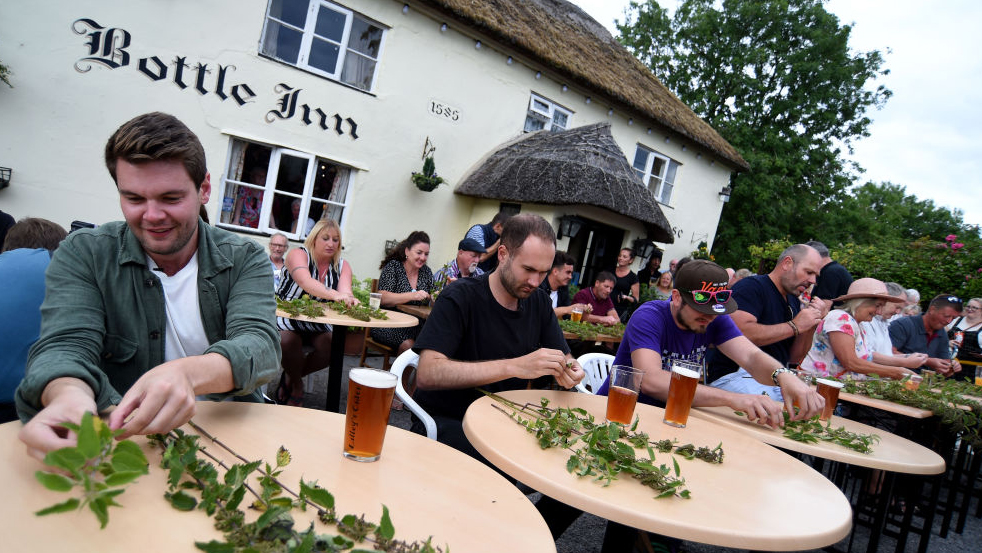
In the heady days of the late 1980s, two Dorset farmers engaged in a bitter argument over who had the longest stinging nettles on their land. In our tale, the pivotal moment occurred when one of the farmers, clearly confident in the glory of his own crop, promised to eat any nettle that was longer than his. Thus began the story of the World Nettle Eating Championships.
The contest, traditionally held every year as part of a charity beer festival at the Bottle Inn, sees competitors presented with stalks of stinging nettles. The premise is a simple one: whoever eats the largest quantity of these poisonous leaves – without throwing up – wins! The plucky participants are allowed to hydrate with water and numb the pain with beer, as they work their way through the leaves.
Wonderfully, the record is held by the aptly named Phil Thorne, who managed to devour 104 feet of stinging nettles in 2018. Great effort.
World Championship Snail Racing – Congham, Norfolk
- Snails race from the center of a circular track
- The winner is the first to reach the perimeter
- The founder started the event in the 1960s, having been inspired by a similar event in France
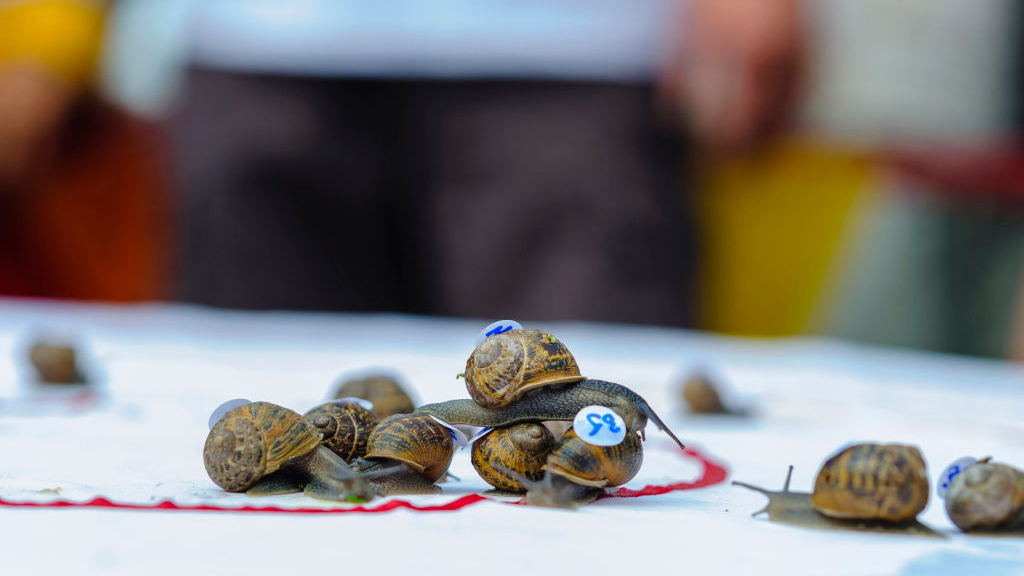
“Ready. Steady. Slow!” calls the Snail Master, as one of the races of the World Championship Snail Racing event gets underway in the English village of Congham. This low-octane spectacle sees several snails start in the center of a circular track, with the winner being the first to reach the perimeter. Another job of the Snail Master is to keep the course well watered, as snails thrive on the damp conditions. The record time, as evidenced in the Guinness World Records, is a blistering 2 minutes, set in 1995 by a snail named Archie.
The story goes that founder Tom Elwes had the idea for the championships in the 1960s, having watched a similar event in France. So, it seems continental eccentricity is to thank in this case. All I want to know is, how does one gain the title of Snail Master? Fancy having that on your résumé!
Worm Charming – Willaston, Cheshire
- In a field divided into 3x3m squares, worm charmers gather
- Their task is the charm worms out of the ground using vibrations and musical instruments
- Whoever charms the most worms is the winner
- The event first took place in 1980

Every summer, a school field in Willaston, Northern England, is divided out into hundreds of square-shaped, 3-by-3-meter plots in preparation for the World Worm Charming Championships. Worm charmers from around the world descend on the field to entice as many creepy-crawlies from the ground as they can, using nothing but vibrations and music.
This bizarre event first took place in 1980, when farmer’s boy William Shufflebotham charmed a grand total of 511 worms from the ground in just half an hour. The benchmark had been set and the preceding decades have seen many a charmer ply their trade on this very special patch of earth. The current record is held by Sophie Smith, a local girl who was 10 at the time, who charmed an incredible 567 worms from their subterranean abodes.
The event is strictly governed by the International Federation of Charming Worms and Allied Pastimes (IFCWAP), who ensure all 18 rules are adhered to by the competitors. All worms are returned underground at the end of the event, to avoid the local birds enjoying a feeding frenzy.
Pancake Racing – Olney, Buckinghamshire
- This ancient event is thought to have first taken place in 1445
- Olney's women race a 415-yard course holding a frying pan and pancake
- Olney enjoy a rivalry with Kansas town Liberal, who've been competing with the English town since 1950
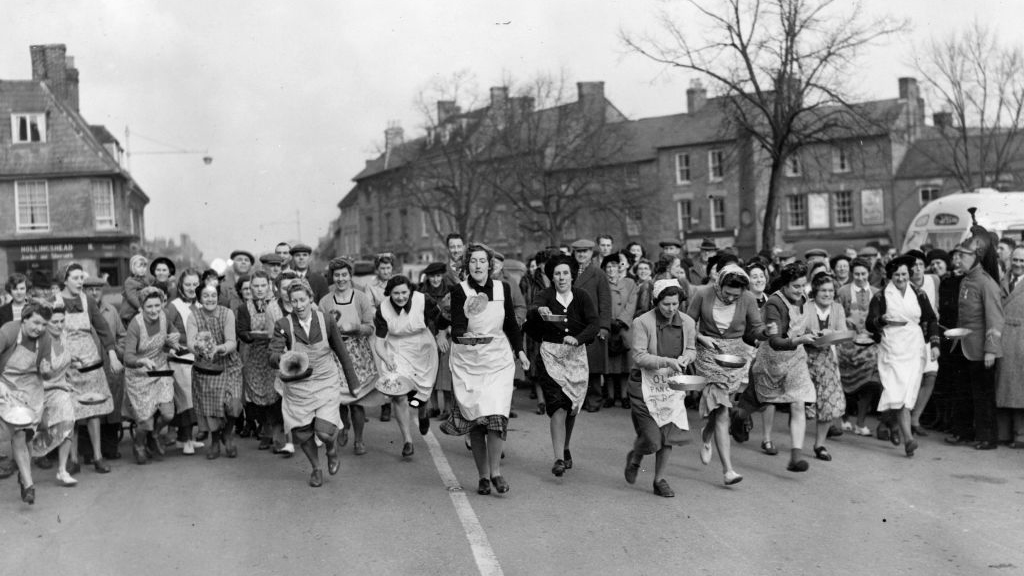
While many of these weird and wonderful championships started in the last century or so, the Olney Pancake Race’s origin goes back much, much further – a long time before there were running shoes. Thought to have first taken place on Shrove Tuesday in 1445, no one is absolutely certain how it came about. A popular theory tells of a harassed housewife hurrying to make it to church on time, absent-mindedly still carrying her frying pan and pancake.
The race takes place on a 415-yard course through the streets and is open to ‘the ladies of Olney only’. Participants carry their pancake in a frying pan and must be able to toss it at the start and finish lines. Other strict rules include the need to wear a skirt, apron and headband.
In 1950, the race went global after the town of Liberal in Kansas challenged Olney to an international competition, where the races are timed to see which town is the winner. The rivalry continues to this day, with Liberal currently the leaders, with 39 victories to Olney’s 31. Hilariously, the 1980 result didn’t stand, as a news van blocked the finish line in Olney – a classic case of the news creating the news. Like the cheese rolling on Cooper’s Hill, tradition was maintained during the Covid-19 pandemic, with a single woman running the course in 2021.
Black Pudding Throwing World Championships – Ramsbottom, Greater Manchester
- Black puddings are thrown at a pile of Yorkshire puddings, held aloft on a 20-foot plinth
- It is a tradition that nods to the War of the Roses, a 15th-century conflict between the historic counties of Lancashire and Yorkshire
Manchester is best known for its soccer teams and vibrant music scene, but its metropolitan sprawl is also the home of the magnificent Black Pudding Throwing World Championships. The city was once part of the historic county of Lancashire, and this is a tradition that’s a nod to the ancient grudge between Lancashire and neighbouring Yorkshire. The two counties famously fought one another during the 15th-century War of the Roses, a conflict thought to have inspired many of the events in George RR Martin's Game of Thrones.
The story goes that during a battle in the village of Stubbins, both sides ran out of ammunition and began hurling black puddings and Yorkshire puddings at each other.
In the modern event, black puddings – a culinary delight harking from Lancashire – are thrown at a pile of Yorkshire puddings, which are unsurprisingly a staple of Yorkshire. To add to the challenge, the Yorkshire puddings are held aloft on a 20-foot plinth. Competitors have to throw underarm from a special stand called the oche. Unsurprisingly, this all takes place outside a local pub, the Royal Oak.
Toe Wrestling World Championships – Wetton, Derbyshire
- Toe wrestling is a lot like arm wrestling, only with toes
- The annual World Championships have been running since 1974
Yet another tradition founded over a round of beers in a country pub, the Toe Wrestling World Championships have been going since 1974 every August at the Haig Bar in Wetton, Derbyshire. The premise is simple yet brutal – it’s basically arm wrestling, but with toes. The bouts take place on a specially constructed podium, or ‘toedium’ that has two walls on either side.
The competitors take it more seriously than you might think. 2022 champion Ben Woodroffe had his big toenail surgically removed in order to gain that all-important competitive edge, while broken toes and blisters are commonplace. Legends of the sport include Alan 'Nasty' Nash, who has claimed the title on 17 occasions, a toetally (ahem) awesome haul. Intriguingly, the event was sponsored by Ben & Jerry’s for 10 years between 2006 and 2016.
Alex is a freelance adventure writer and mountain leader with an insatiable passion for the mountains. A Cumbrian born and bred, his native English Lake District has a special place in his heart, though he is at least equally happy in North Wales, the Scottish Highlands or the European Alps. Through his hiking, mountaineering, climbing and trail running adventures, Alex aims to inspire others to get outdoors. He's the former President of the London Mountaineering Club, is training to become a winter mountain leader, looking to finally finish bagging all the Wainwright fells of the Lake District and is always keen to head to the 4,000-meter peaks of the Alps. www.alexfoxfield.com









